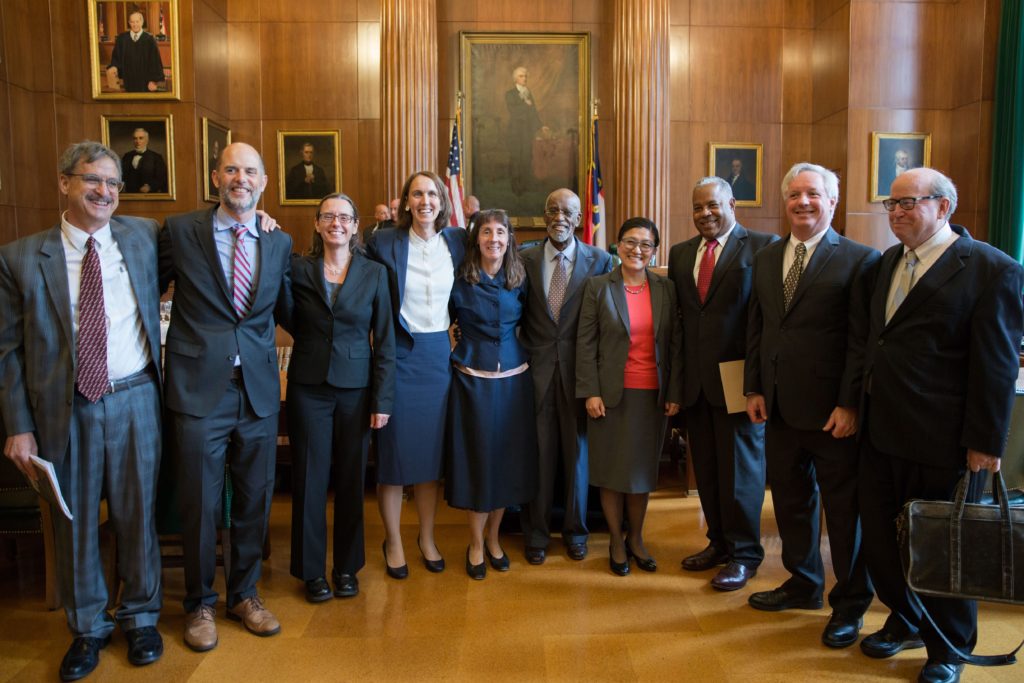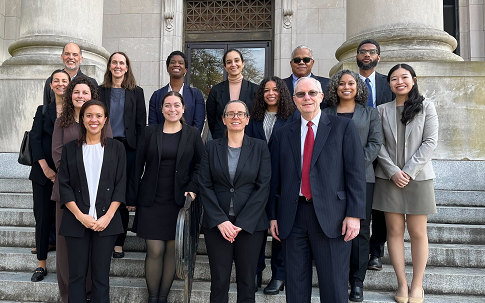
A key factor keeping executions on hold in North Carolina is the Racial Justice Act, a groundbreaking law that CDPL helped to advocate for in 2009, after several innocent Black men were exonerated from death row. In the years since, the law has exposed an epidemic of race discrimination in capital cases. So far, four death row prisoners have been resentenced to life after proving that race discrimination infected the jury selection process at their trials. Now, CDPL is part of a team that is beginning a new phase of litigation under the law, which will prove even more clearly that North Carolina’s Black citizens have been systematically denied the right to serve on capital juries, Black people are targeted for the death penalty, and the death penalty is overwhelmingly used to avenge the killings of white people, not citizens of color.
In 2013, the North Carolina legislature attempted to repeal the Racial Justice Act, invalidating dozens of claims filed under the law and effectively burying the evidence of racism the RJA had uncovered. However, in 2020, the State Supreme Court issued a landmark ruling affirming that all defendants who filed claims were entitled to hearings. The Court described the Racial Justice Act this way: “The goal of this historic legislation was simple: to abolish racial discrimination from capital sentencing. That is, to ensure that no person in this state is put to death because of the color of their skin.” CDPL will continue to work to ensure that no one is executed in North Carolina based on a death sentence tainted by racism.
The Evidence
A comprehensive study conducted by researchers at Michigan State University analyzed N.C. capital cases from 1990 to 2010, the years when almost all of North Carolina’s approximately 135 death row prisoners were tried. It found that qualified Black citizens were struck from death penalty juries at more than twice the rate of whites. The researchers controlled for other factors, and the disparity was attributable only to race.
In addition, the RJA revealed direct evidence of discrimination, such as prosecutors’ notes referring to potential Black jurors with terms including “blk wino” and “thug.” The RJA also uncovered documents from a training seminar where N.C. district attorneys were taught to evade the law banning race-based exclusion of jurors. Prosecutors were provided with a list of fabricated excuses to use when removing Black jurors. The training handout included preposterous reasons such as hairstyle, an “air of defiance,” or a failure to make eye contact with the prosecutor. Many prosecutors across North Carolina have cited these excuses verbatim when removing Black jurors.
The History
Black people have been denied the right to serve on juries throughout American history. Black people in America have routinely been sentenced to death in courtrooms where every lawyer, judge, and juror was white. Some of those people were innocent. While citizens of color were once kept off juries by openly racist laws and policies, the discrimination is now more difficult to detect. Prosecutors now use peremptory strikes to remove Black jurors. But the effect is the same. Of the people on death row today, nearly half were sentenced by overwhelmingly white juries.
To learn more about the death penalty’s entanglement with North Carolina’s history of racism, explore CDPL’s project Racist Roots. This essay, We Should All Belong in the Jury Box, provides more context about the exclusion of Black jurors.
Why It Matters
The right to a jury of one’s peers is a fundamental Constitutional right. For most Americans, serving on a jury is, along with voting, the most direct way to participate in democracy. Studies also show that diverse juries deliberate more thoroughly and are less likely to convict innocent people.
The Cases
In August 2019, the State Supreme Court heard arguments in six RJA cases. Ultimately, the Court resentenced four of the defendants to life and ordered hearings for two defendants who had never had their day in court. The record in all of these cases reveals despicable and profoundly troubling evidence of racism:
- During jury selection in Tilmon Golphin’s case, a prospective African American juror heard two white jurors saying that Mr. Golphin “should have never made it out of the woods” [when he was taken into police custody]. The African American juror was struck, in part, because he reported overhearing these statements. It is unknown whether the white jurors who made the comments served on Mr. Golphin’s jury. Read Tilmon Golphin’s full brief and the NCSC opinion.
- “In front of an all-white jury, the prosecutor explicitly drew attention to [Rayford] Burke’s race. In closing arguments, while urging jurors to find [Mr.] Burke guilty, the prosecution referred to [Mr.] Burke as a ‘big black bull.’” Read Rayford Burke’s full brief and the NCSC opinion.
- In the courtroom where Andrew Ramseur was tried, there was crime scene tape cordoning off the four rows behind him; his family, including his elderly grandfather, was literally required to sit in the back of the courtroom while the family of the white victim sat in the front. Read Andrew Ramseur’s full brief and the NCSC opinion.
- The prosecutor in Quintel Augustine’s case wrote notes about prospective jurors. He described a Black juror who drank as a “blk. Wino” but a white juror who drank as a “drinks–country boy–OK.” He described a Black female juror as “ok” because she was from a “respectable blk family” while other jurors were described as being from a “blk high-drug” area. Read Quintel Augustine’s full brief and the NCSC opinion.
- During jury selection in Marcus Robinson’s case, the prosecutor asked a Black high school graduate whether he had repeated any grades or had trouble reading, questions he had asked no white juror. The prosecutor later testified that he recognized that he harbors implicit racial biases. Read Marcus Robinson’s full brief and the NCSC opinion.
- At Christina Walters’ trial, the prosecutor struck 10 of 14 potential black jurors, a strike rate of 3.6 times that of potential white jurors. Her explanations for why she struck black jurors did not hold up to scrutiny. For example, the prosecutor struck one black juror because he “did not feel like a victim” after his car had been broken into and a CD player stolen. Yet, she kept two white jurors who minimized the impact of their experience as victims of minor property crimes. Read Christina Walters’ full brief and the NCSC opinion.
In 2024, the case of Hasson Bacote was heard in Johnston County. He proved that racism was rampant in death penalty trials in Johnston County, affecting not just the makeup of the jury but also making Black men more likely to be sentenced to death. Read a summary of the evidence. Mr. Bacote is now serving life without parole. Among the judge’s findings:
- The prosecutor who tried Mr. Bacote and others on death row struck Black jurors at three times the rate of white jurors. He also routinely referred to Black defendants with thinly veiled racist terms such as “piece of trash” or “predators of the African plain.” He called Mr. Bacote a “thug” in front of the jury.
- All 8 of the Black men tried in Johnston County in the death penalty’s modern era received death sentences. Only about half of the white defendants were sent to death row.
- Johnston County’s history of blatant racism, including billboards advertising the KKK, continues to affect how the death penalty is carried out there today.
Read the judge’s full order or CDPL’s press release and analysis.
See a Racial Justice Act timeline here.

